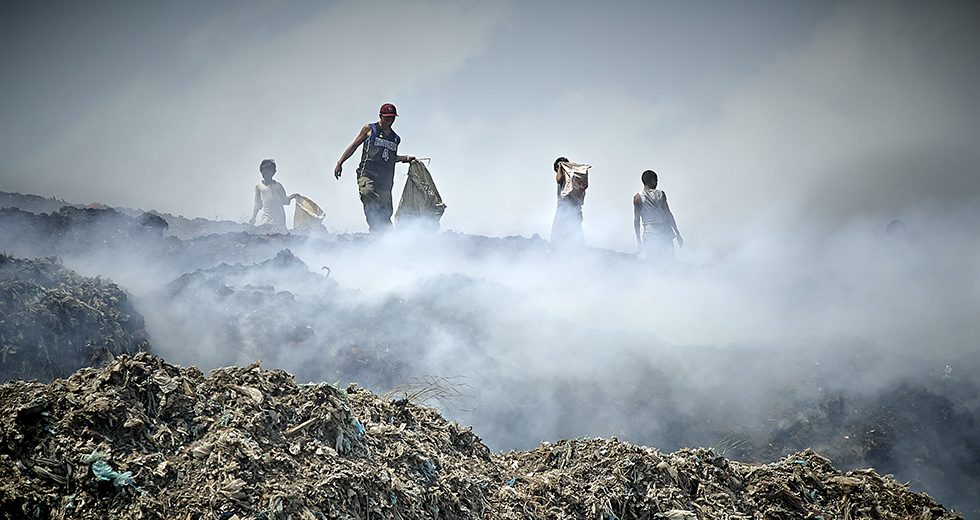Decade for Climate Justice launches with call to seek a just eco-spirituality
Posted on June 20, 2023 by Phil Tanis

A call to listen to the marginalized, including all of God’s creation, was at the center of a webinar launching the World Communion of Reformed Churches (WCRC) Decade for Climate Justice.
“We hold the economic crisis and ecological crisis as being interlinked. The way to find alternatives to this is to learn from those who are marginalized—and from the earth, which itself is marginalized in our present system,” said Philip Vinod Peacock, WCRC executive for justice and witness.
Helen Chukka, assistant professor of Hebrew Bible at Wartburg Seminary, focused her presentation on the Book of Job, saying, “Job urges his friends—and us—to draw lessons from both himself and the creatures of the earth. Job emphasizes that these creatures existed before humans but are now suffering. He presents them as storytellers able to speak for themselves.
“The book focuses on the issues surrounding justice and its manifestations. It highlights the struggles and sufferings of those on the margins, encouraging readers to reflect on their plight,” she said, specifically noting Job 12:7-10:
But ask the animals, and they will teach you;
the birds of the air, and they will tell you;
ask the plants of the earth, and they will teach you;
and the fish of the sea will declare to you.
Who among all these does not know
that the hand of the Lord has done this?
In his hand is the life of every living thing
and the breath of every human being. (NRSV)
“The dominant worldview today, however, that is at the root of dominant interpretations within Christianity, is a disordered one wherein we see humans as divorced from and superior to the rest of the natural world,” said Jessica Hetherington, an ecotheologian and ordained minister in The United Church of Canada.
“When we see ourselves as separate from and superior to the natural world around us, then we deny the scientific reality of evolution, and the way that human beings have emerged into an incredibly complex, interconnected and interdependent web of all that exists. Further, we then deny that God created all of creation, all of it, through the engine of evolution, and as we affirmed in our first creation story, that God called it good,” she said.
“We need to develop an eco-spirituality that seeks to become ever-more aware of the ways in which we are in community with all of life and what sustains it here on Earth. We need to become ever-more aware of the harms that we have caused to the Earth, especially through the climate crisis, and be able to listen to the cries of the Earth community,” she said. “And, we need to move toward a just eco-spirituality that can ground us in God, help us to hear God’s call of discipleship on our lives, and spur us to action, so that we can use all of our time, talents, and treasures toward the radical and transformative climate justice that we need now, today.”
The climate crisis “is not an accident, but it is a consequence of humanity’s failure to hear the groans of creation amidst the desire for more control and consumption of earthly resources,” said Eve Rebecca Parker, lecturer in modern theology at the University of Manchester. “It is a crisis of abuse, not just of the land, but of workers, of children, of Indigenous communities.
“I want to suggest that what is needed is a politically charged theological response of anger and lament,” she said. “It is about acknowledging the need to be angry, and lament at the realities of the climate crisis, because as Christian’s we are taught to lament the injustices on earth, just as the biblical laments do, and name what is wrong, name the evils and resist such evils and in doing so express eschatological hope, by bearing witness to what should not be and therefore to what should be, and what will be, according to God’s promises.”
Jessica Bwali, global campaigns associate for Tearfund, speaking as one of the marginalized youth, said, “Old people, people in power: allow young people to sit at the table and listen to them. Let them bring the ideas that they have. They may not be as polished or as realistic, but there is where the experience comes in as a leader—this is the direction we can take. If we can combine these generations, we can protect our environment.”
“How else can young people get involved?” she asked. “Make your voice heard. One of the biggest assets young people have in the climate fight is the ability to make themselves be heard on a global scale. Apply your interests to the climate fight: take action through the things you love.”
“The Decade for Climate Justice is a concept that addresses the just division, fair sharing, and equitable distribution of the burdens of climate change, its mitigations, and responsibilities,” said Hefin Jones, senior lecturer at Cardiff University’s School of Biosciences, and moderator of the webinar, which was themed “Learning from the Earth, Witnessing for Climate Justice.”
The webinar launching the Decade for Climate Justice was held on 5 June, World Environment Day. Funds from Otto per Mille are used to support this initiative.
Watch the full webinar (in English):
Image: Although officially closed as a dump site for Manila, “Smokey Mountain” remains a resource for scavengers who tease items of value out of the still-smoking mound of garbage (photo courtesy of: Life on Earth/Paul Jeffrey).
 World Communion of Reformed Churches
World Communion of Reformed Churches